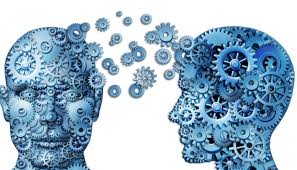This blog is by a mate of mine, Samuel Johns. On our tough cycle ride recently around Rwanda, we talked about the effect of Facebook and such like, and I asked him to share some thoughts, which I found challenging/disturbing/fascinating and more. I’m interested in what you make of them too. Over to Sam:

A soft alarm wakes me – perfectly in sync with my circadian rhythms – and I trundle downstairs, set to face a new week. Alex notifies me of the weather, so the blinds remain closed. Ambient lighting matches my mood. Morose, yet determined. Another Monday morning. Breakfast is served to me by Xeva, my ever-present home helper, whilst Jibu helps me plan ahead, and visualise my calendar, by running through my meetings for the day. Ping. The time has come – 8am, time to brave the world. Tap, I order an UberAir. The sky taxi arrives in 3 minutes, just time to brush my teeth. Whisk. Off I go, merging with the air traffic & Amazon drones, doing their routine deliveries, keeping the world going…
The world according to GAFA – Google, Amazon, Facebook, Apple – sounds like it may be just this by 2025 or so. Indeed, Dave Eggers in his 2013 book ‘The Circle’ portrays in fantastic – and sometimes chilling colours – just what this world may be like. The future is here, and it’s here now.
Last week I was cycling in central Africa with Simon and a group of 15 or so in the stunning beauty of the Rwandan hills. Every evening, with the sun setting on Lake Kivu, we’d be resting and our group would become glued to our devices. As Simon would say – ‘Come on people, get off your chaffing iPhones, enjoy the view, talk to each other!’
Interestingly, Facebook were busy last week too. They acquired two new patents – pretty interesting ones as well. They got one for webcams, to interpret the emotional state of people at their devices through the small camera in your laptop or phone, so as to market more appropriately and provide ’emotionally relevant’ content. And the second patent Facebook got was on typing speed, linking our taps at our keyboards with our moods, so as to market better, once again. Targeted advertising – the lifeblood of the data generation. Though of course data is only one of many interesting issues raised – alongside privacy, security, anonymity, even consent.

The question I want to ask here is one of ‘neuroplasticity’ – how plastic are our brains? How mouldable are we, truly, once we leave school and formal education? Are we being shaped everyday? And how do digital technologies contribute to this?
It may come as no surprise that the answer is ‘very’. Neurons that fire together, wire together. Psychologists use this expression to explain many things from addiction to memory, reminding us that neural pathways are like stray footpaths – the more you use them, the more concretised they become. And once concretised, then familiar, preferential, favoured. The path of least resistance. The question is, are we are aware of this? Likely, yes. Yet do we live like we’re aware? Likely not.
App developers – as we had in our midst on our cycle ride on Rwanda – know a lot about dopamine. Dopamine is a neurotransmitter that the brain releases to control its pleasure and reward centres. A shot of dopamine and you feel happy. Another like on Instagram, and you feel a rush of attention. A retweet by someone famous, my word, that’s like an adrenaline rush. Critics of this stuff, though, like to draw attention to ‘the never-ending flood of content that threatens constant distraction’ (Brandon, 2016:161). Distraction is no bad thing, so long as it is managed – right? Well the critics continue; ‘[this can] undermine our ability to focus and, implicitly, reduce our capacity to relate to each other – in the most basic terms, to love’ (ibid.).
Shocking.
So whilst we were all sat there in the Rwandan hills, tapping, scrolling, zooming, and posting – Brandon and others were concerned for us. What was all this doing to our brains, to our relationships, to our families and friends? He continues – these technologies could ‘compromise our ability to relate by sensitising the mind to distraction [which] undermines our ability to love’ (p.30).

The argument goes that we inhabit a society of turbo-consumerism. Not only do we consume things, but we’re being trained – perhaps our brains even re-wired – to consume experiences, content, opinions, even people. Brandon describes this as ‘the idea that the world should be shaped around my needs and desires, and that I express myself through the choices I take…Everything is subject to this tendency – including social relationships’ (p.4). He warns that ‘this mindset is diametrically opposed to contentment’ (ibid.).
Let’s flesh this out briefly. Tomlinson describes the situation above as living in the midst of immediacy. If we think of everything as a journey, from A → B – whether in physical terms to work, or mobile terms in communication (letters/texts/emails), or indeed emotional terms, in building trust, acceptance, respect – Tomlinson says we have now ‘abolished the middle term’ (2007:91), or the arrow in the above. So rather than A → B we now simply have AB. ‘A journey without destination, an arrival without departure, and speed without progress’ (ibid.). What is the relational fallout of this? What can we expect?
As a Christian on Simon’s brilliant cycle tour in Rwanda, I was struck by the words of the Croatian theologian, Miroslav Volf; the essence of an ’embrace’, of reconciliation, indeed of trust at the most basic level, is ‘the will to give ourselves to others and ‘welcome’ them, to readjust our identities to make space for them, prior to any judgement about others, except that of identifying them in their humanity’ (Volf, 1996:29). Are we training ourselves well for this? Are we fit for action?
Amidst all the scrolling, clicking, and sharing – even in the incredible surroundings of Lake Kivu – I was struck by the ancient wisdom of Seneca, the Roman Stoic philosopher. Born in Spain in 4 BC when surely 4G was fairly scant, he cautioned; ‘to be everywhere, is to be nowhere’.
Sources: Brandon (2016) ‘Digitally Re-Mastered’. Tomlinson (2007) ‘The Culture of Speed’. Volf (1996) ‘Exclusion & Embrace’
Im sure that social media is eroding ours sensitivities to others and distorting our lives. We are fearfully and wonderfully made. As a Christian I’ve now started a discipline of twice daily meditation to offset some of lunacy of contemporary life. I look forward to following your blog.
Identity politics dovetails nicely with the aim that advertisers have of assigning everyone to multiple demographics in order to target ads and content to them. Are you a young woman? Read this; watch that; buy this product. Are you an middle-aged black man? You’ll like this; buy that product. Are you gay? We have content and products just for you.
Read it all and I agree ! Exchanging little time for big experiences. We have to take inventory and ask the Lord. We MUST PLEASE HIM FIRST in all we do!
Simon, please encourage Samuel to keep reflecting and blogging. This blog was great.
Thank you for sharing this. A great blog and I totally agree. We need more of this to inside knowledge. This supports my uneasy feelings we have that something just isn’t quite right, quite true, with all this social media, that it’s now scarily unstoppable so we need qualified knowledge and so that we can teach our children. As a parent of teenagers seeing the ‘hold’ that their technology has on them, this post exposes what we sense is happening (a kind of very subtle brainwashing which is difficult to put your finger on). There is advice everywhere, including the social media giants themselves, to say that social media (and the internet) must be used responsibly, and yet GAFA abuse this in a much more subtle and disturbing way – so that it goes unnoticed by the majority.
God will use this for his glory.
An interesting and challenging read. Thanks . Keep sending please. John
This maybe somewhat simplistic but if you have been set free from something like alcoholism it is advisable to avoid altogether; but there is nothing wrong with A drink if you are a disciplined person. It seems that people today lack a complete sense of discipline! Children who are asked to switch off kick up such a fuss that most parents give in and let them continue – what damage is that doing? I think it is obvious.
If we are spending more time on these ‘communication’ methods than we are spending in the word, learning, mediatating and discussing with the Lord, then it has become an IDOL! Let’s help the children – and others – by sharing the dangers of what this time consuming communication is doing.
Amen